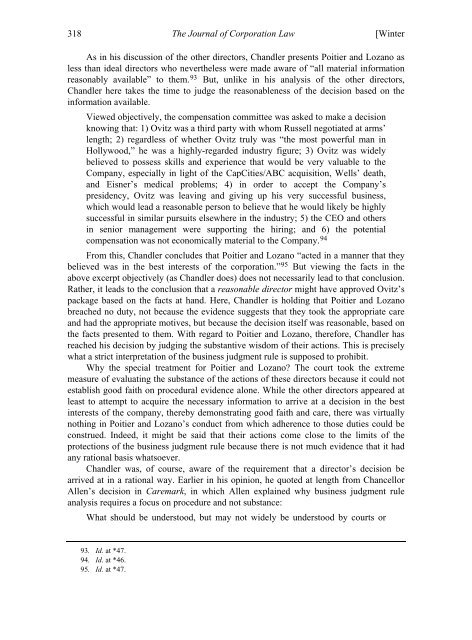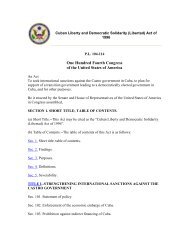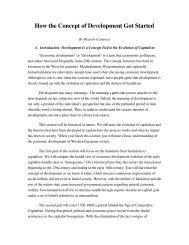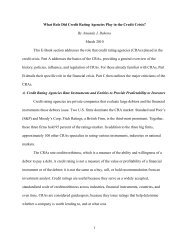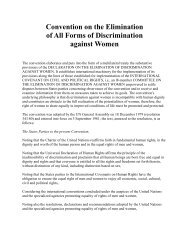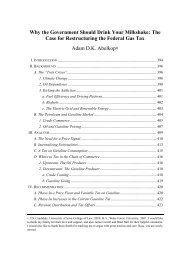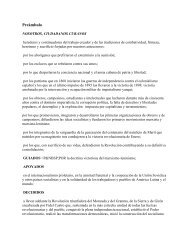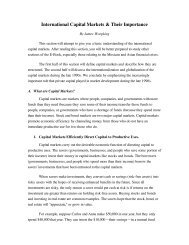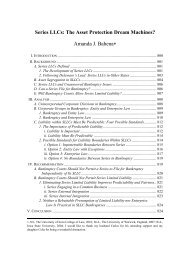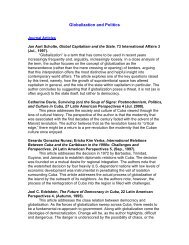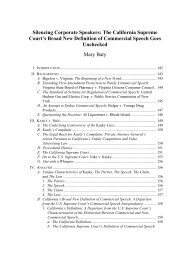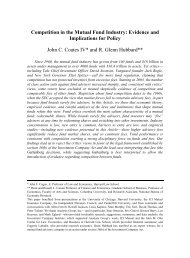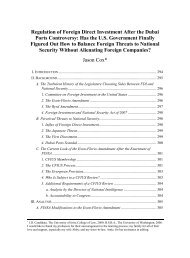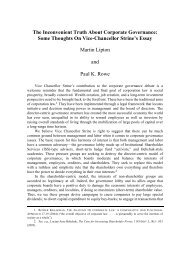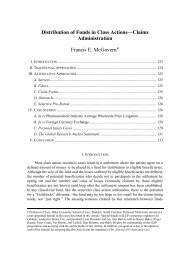Galactic Stupidity and the Business Judgment Rule - College of Law
Galactic Stupidity and the Business Judgment Rule - College of Law
Galactic Stupidity and the Business Judgment Rule - College of Law
You also want an ePaper? Increase the reach of your titles
YUMPU automatically turns print PDFs into web optimized ePapers that Google loves.
318 The Journal <strong>of</strong> Corporation <strong>Law</strong> [Winter<br />
As in his discussion <strong>of</strong> <strong>the</strong> o<strong>the</strong>r directors, Ch<strong>and</strong>ler presents Poitier <strong>and</strong> Lozano as<br />
less than ideal directors who never<strong>the</strong>less were made aware <strong>of</strong> “all material information<br />
reasonably available” to <strong>the</strong>m. 93 But, unlike in his analysis <strong>of</strong> <strong>the</strong> o<strong>the</strong>r directors,<br />
Ch<strong>and</strong>ler here takes <strong>the</strong> time to judge <strong>the</strong> reasonableness <strong>of</strong> <strong>the</strong> decision based on <strong>the</strong><br />
information available.<br />
Viewed objectively, <strong>the</strong> compensation committee was asked to make a decision<br />
knowing that: 1) Ovitz was a third party with whom Russell negotiated at arms’<br />
length; 2) regardless <strong>of</strong> whe<strong>the</strong>r Ovitz truly was “<strong>the</strong> most powerful man in<br />
Hollywood,” he was a highly-regarded industry figure; 3) Ovitz was widely<br />
believed to possess skills <strong>and</strong> experience that would be very valuable to <strong>the</strong><br />
Company, especially in light <strong>of</strong> <strong>the</strong> CapCities/ABC acquisition, Wells’ death,<br />
<strong>and</strong> Eisner’s medical problems; 4) in order to accept <strong>the</strong> Company’s<br />
presidency, Ovitz was leaving <strong>and</strong> giving up his very successful business,<br />
which would lead a reasonable person to believe that he would likely be highly<br />
successful in similar pursuits elsewhere in <strong>the</strong> industry; 5) <strong>the</strong> CEO <strong>and</strong> o<strong>the</strong>rs<br />
in senior management were supporting <strong>the</strong> hiring; <strong>and</strong> 6) <strong>the</strong> potential<br />
compensation was not economically material to <strong>the</strong> Company. 94<br />
From this, Ch<strong>and</strong>ler concludes that Poitier <strong>and</strong> Lozano “acted in a manner that <strong>the</strong>y<br />
believed was in <strong>the</strong> best interests <strong>of</strong> <strong>the</strong> corporation.” 95 But viewing <strong>the</strong> facts in <strong>the</strong><br />
above excerpt objectively (as Ch<strong>and</strong>ler does) does not necessarily lead to that conclusion.<br />
Ra<strong>the</strong>r, it leads to <strong>the</strong> conclusion that a reasonable director might have approved Ovitz’s<br />
package based on <strong>the</strong> facts at h<strong>and</strong>. Here, Ch<strong>and</strong>ler is holding that Poitier <strong>and</strong> Lozano<br />
breached no duty, not because <strong>the</strong> evidence suggests that <strong>the</strong>y took <strong>the</strong> appropriate care<br />
<strong>and</strong> had <strong>the</strong> appropriate motives, but because <strong>the</strong> decision itself was reasonable, based on<br />
<strong>the</strong> facts presented to <strong>the</strong>m. With regard to Poitier <strong>and</strong> Lozano, <strong>the</strong>refore, Ch<strong>and</strong>ler has<br />
reached his decision by judging <strong>the</strong> substantive wisdom <strong>of</strong> <strong>the</strong>ir actions. This is precisely<br />
what a strict interpretation <strong>of</strong> <strong>the</strong> business judgment rule is supposed to prohibit.<br />
Why <strong>the</strong> special treatment for Poitier <strong>and</strong> Lozano? The court took <strong>the</strong> extreme<br />
measure <strong>of</strong> evaluating <strong>the</strong> substance <strong>of</strong> <strong>the</strong> actions <strong>of</strong> <strong>the</strong>se directors because it could not<br />
establish good faith on procedural evidence alone. While <strong>the</strong> o<strong>the</strong>r directors appeared at<br />
least to attempt to acquire <strong>the</strong> necessary information to arrive at a decision in <strong>the</strong> best<br />
interests <strong>of</strong> <strong>the</strong> company, <strong>the</strong>reby demonstrating good faith <strong>and</strong> care, <strong>the</strong>re was virtually<br />
nothing in Poitier <strong>and</strong> Lozano’s conduct from which adherence to those duties could be<br />
construed. Indeed, it might be said that <strong>the</strong>ir actions come close to <strong>the</strong> limits <strong>of</strong> <strong>the</strong><br />
protections <strong>of</strong> <strong>the</strong> business judgment rule because <strong>the</strong>re is not much evidence that it had<br />
any rational basis whatsoever.<br />
Ch<strong>and</strong>ler was, <strong>of</strong> course, aware <strong>of</strong> <strong>the</strong> requirement that a director’s decision be<br />
arrived at in a rational way. Earlier in his opinion, he quoted at length from Chancellor<br />
Allen’s decision in Caremark, in which Allen explained why business judgment rule<br />
analysis requires a focus on procedure <strong>and</strong> not substance:<br />
What should be understood, but may not widely be understood by courts or<br />
93. Id. at *47.<br />
94. Id. at *46.<br />
95. Id. at *47.


